The Latest News from PA Chapter of APA…
Although planning has frequently encouraged inclusivity and equity, these issues have often taken a back seat to other planning concerns. In 2020, that changed, and now equity and inclusion are on everyone’s radar. This month, we highlight a plan from Philadelphia that takes a more direct approach on equity and inclusion; an equity-focused training seminar from the Pittsburgh Community Reinvestment Group; a planner, Amy Wiles, who works at a woman and minority owned planning firm and specializes in inclusive planning approaches; and Sal Galdamez, the CEO of York XL, who shows how a community can be built from the ground up. Enjoy!
The next Webinar Wednesday, Planning at the Intersection of Technology, Growth, Revitalization and Inclusion… is scheduled for April 7, 2021 from 12:00 PM to 1:15 PM. The United States and the World are in the midst of the 4th Industrial Revolution. The forces of globalization, automation, connectivity, changing demographics, and shared and on-demand economy are changing everything from how we communicate to do business. The form of our communities is changing and individual governments, non-profits, businesses, civic leaders and influencers will need to work together to rise to the challenges of the new emerging economy. Pennsylvania is in a unique position with a ready workforce, reuse opportunities, connected transportation systems, an abundance of higher education and technical training facilities, and the ever-important location, location, location, to serve as a leader. Utilizing the case study of Lehigh Valley, with the highest new industrial facility growth rate in the US, 70 years of population growth, success in reuse and redevelopment, and regional collaborations, the session will explore how to position your community for success. Deadline to register is Tuesday, April 6.
If you are interested in sponsoring a Webinar Wednesday session or have a session for Webinar Wednesday, please contact us. Send your request to info@planningpa.org.
Support the Conference!
The Pennsylvania Chapter of the American Planning Association’s 2021 Conference will be held on October 17-19 at the Sheraton Pittsburgh Hotel at Station Square, Pittsburgh. We invite you support the conference by sponsoring, exhibiting or advertising. The conference provides a unique and effective opportunity to showcase your work and capabilities to planning professionals and policy makers from across the Commonwealth. It’s also one of the ways to support planning in Pennsylvania by providing valuable networking, education, and development for planners.
2021 Great Places
The Pennsylvania Chapter of the American Planning Association is looking for Great Places in three categories: Great Public Spaces, Great Greenways/Trails, and Great Streets. Great Places are unique, memorable places that display community planning best practices, have an exemplary character, and a sustainable vision for tomorrow.
2021 Planning Awards: Call for Nominations
The Pennsylvania Chapter of the American Planning Association is pleased to invite nominations for the Annual Awards, which will be presented at the Annual Conference. Nominations are encouraged for plans, projects, practices, and leaders. Showcase the best and brightest of Pennsylvania planning!
Penn State Extension
Penn State Extension offers webinars. Check out the latest webinar, Planning for Growth, Prosperity & Resiliency…April 21, 2021. For more information visit Penn State Extension‘s website or contact Peter Wulfhorst.
Opportunities for Giving
Each year the Chapter offers a scholarship to support individuals seeking funds for academic degree programs, internships, and professional development activities. If anyone would like to contribute to the Chapter’s Scholarship fund, donations can be made here. We accept all major credit cards, or you can send a check. Please make your check payable to “PA Chapter of APA Scholarship Fund” and mail it to P.O. Box 4680, Harrisburg PA 17111.
Planning for Power: Leading Communities in Planning Processes – Examples from Pittsburgh and Allentown
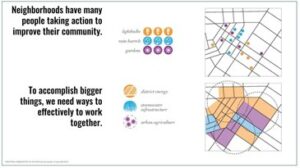 Meaningful, inclusive public engagement is critical to achieve resilient, equitable, and inclusive communities that are livable for all. On March 9th, planners from the City of Pittsburgh, Allentown PA, and evolve environment + architecture presented at a webinar hosted by the Pittsburgh Community Reinvestment Group (PCRG) on planning approaches that aim to re-establish trust and level the playing field to co-create actionable, transparent, and equitable plans alongside communities. New approaches are necessary to help establish enforceable ground rules for developers, employers, and public agencies coming into a community. Particularly when markets switch from disinvestment to growth, equitable, transparent planning influenced by an informed, engaged resident base allows change to happen with, rather than to, a community.
Meaningful, inclusive public engagement is critical to achieve resilient, equitable, and inclusive communities that are livable for all. On March 9th, planners from the City of Pittsburgh, Allentown PA, and evolve environment + architecture presented at a webinar hosted by the Pittsburgh Community Reinvestment Group (PCRG) on planning approaches that aim to re-establish trust and level the playing field to co-create actionable, transparent, and equitable plans alongside communities. New approaches are necessary to help establish enforceable ground rules for developers, employers, and public agencies coming into a community. Particularly when markets switch from disinvestment to growth, equitable, transparent planning influenced by an informed, engaged resident base allows change to happen with, rather than to, a community.
The webinar is part of a series leading up to PCRG’s 11th Annual Community Development Summit being held virtually from May 25-26, 2021 with the focus of [Re]Defining Equity, Equality, and Justice in Community Development (more information about the summit here).
The presenters provided examples of planning practices that bolstered public trust, addressed equity issues, and improved planning outcomes, these included:
- Hannah Clark, AI
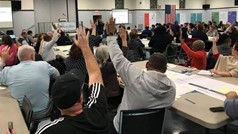 CP (formerly of City of Allentown, now with Michael Baker International) and evovleEA’s Ashley Cox, EcoDistricts AP shared how Allentown’s Vision 2030 Community Planning Strategy helped ensure that in a now majority-minority city that is continuing to grow, the city’s residents are fully part of the comprehensive planning and implementation process;
CP (formerly of City of Allentown, now with Michael Baker International) and evovleEA’s Ashley Cox, EcoDistricts AP shared how Allentown’s Vision 2030 Community Planning Strategy helped ensure that in a now majority-minority city that is continuing to grow, the city’s residents are fully part of the comprehensive planning and implementation process; - City of Pittsburgh Neighborhood Planners Ose Akinlotan and Sophia Robison
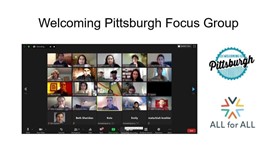 provided an overview of the Public Engagement Guide and how that process, alongside innovations in virtual engagement due to the COVID-19 Pandemic, helped communities co-create engagement goals and establish equity and transparency standards between themselves and the City on specific planning endeavors;
provided an overview of the Public Engagement Guide and how that process, alongside innovations in virtual engagement due to the COVID-19 Pandemic, helped communities co-create engagement goals and establish equity and transparency standards between themselves and the City on specific planning endeavors; - evolveEA strategic principal Christine Mondor, FAIA provided an overview of evolveEA’s Community Engagement Strategy Deck, which provides over thirty activities to gain knowledge of complex issues while sharing community expertise.

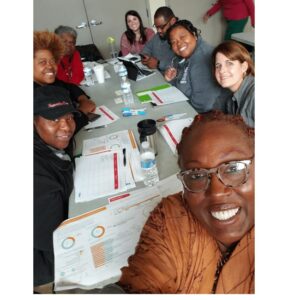 At the 2020 Annual APA PA Awards ceremony, the Association gave the Philadelphia Housing Authority an award for its Blossom at Bartram plan, which focuses on both the revitalization of the Bartram Village 500-unit public housing development and the adjacent neighborhood, recognizing that the housing and its neighborhood have an interdependent connection with each other.
At the 2020 Annual APA PA Awards ceremony, the Association gave the Philadelphia Housing Authority an award for its Blossom at Bartram plan, which focuses on both the revitalization of the Bartram Village 500-unit public housing development and the adjacent neighborhood, recognizing that the housing and its neighborhood have an interdependent connection with each other.
This excellent plan was developed with extensive public engagement to get critical input while restoring trust and transparency. During the process, residents of Bartram Village and the neighborhood served on all committees, a six-part Neighborhood Leadership series was held, seven neighborhood ambassadors were hired, and five large community events were held.
Three themes provided the plan’s organizing principles – Connect, Live, Thrive. These three themes then inform all the recommendations in the plan. As the plan was being developed, implementation began, with the transformation of three vacant properties into affordable housing, the delivery of fresh produce by Philabundance once a month, and the greening of 60 vacant lots by the Philadelphia Horticultural Society. Immediately after the plan was adopted, the community began a gateway project and a homeowner improvement program.
Great Places in Pennsylvania Spotlight
The Great Places in Pennsylvania program began in 2014. This program highlights places in the Commonwealth that are prime examples of good planning and are centerpieces of their communities, highlighting connectivity, community engagement and economic opportunity. Each month, we will highlight a recent Great Places award winner.
In 2018, the Schuylkill River West Trail in Upper Merion Township, Montgomery County was designated as a Great Place in the Great Greenways/Trails category. The Schuylkill River West Trail is a 2.2 mile trail between Upper Merion Township’s Heuser Park and Valley Forge National Park. Running along the Schuylkill River, the trail is part of a proposed 15.5 mile network of trails connecting the municipalities of Lower Merion, West Conshohocken, Bridgeport and Upper Merion.
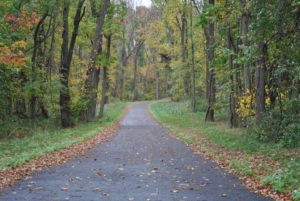
The Upper Merion Township portion of the trail is 12 feet wide and accommodates two-way bicycle and pedestrian traffic. It provides a link between housing, employment centers, retail destinations and recreation areas including Valley Forge National Park. The trail design incorporates green infrastructure to help the township meet stormwater management requirements. It was the goal of the Township to create a “truly walk-able, hike-able, and bike-able place to live and work” where “each residence, business or institution is within close proximity to a sensitively designed, safe, easy-to-use, and well-maintained pedestrian and bicycle route”.
An Interview with Amy Wiles, AICP
Amy Wiles, AICP is currently the Manager of Planning and Design at E. Holdings, Inc. (www.eholdingsinc.com),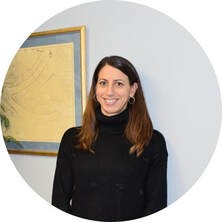 which is a small woman- and minority-owned consulting firm in the City of Pittsburgh. At EHI, Amy manages a wide variety of community planning projects, including community visioning studies, wayfinding and signage master plans, housing studies, and community engagement projects. Prior to her work at EHI, Amy was a planner with Mackin Engineering Company and is a graduate of Penn State University, including a summer semester at Leiden University, The Netherlands. Amy is currently serving as the APA-PA Southwest Section Secretary as well as the Section’s Professional Development Officer.
which is a small woman- and minority-owned consulting firm in the City of Pittsburgh. At EHI, Amy manages a wide variety of community planning projects, including community visioning studies, wayfinding and signage master plans, housing studies, and community engagement projects. Prior to her work at EHI, Amy was a planner with Mackin Engineering Company and is a graduate of Penn State University, including a summer semester at Leiden University, The Netherlands. Amy is currently serving as the APA-PA Southwest Section Secretary as well as the Section’s Professional Development Officer.
- How and why did you decide to become a planner?
I started working as a planner for Mackin Engineering Company right out of college. I wasn’t exactly sure what I wanted to do with my life yet, but I began working with communities on a variety of planning projects and really enjoyed the diversity of topics. I knew I wanted to help people in some capacity, and planning seemed like a way to do it at a community-scale. I really like working with communities to help figure out what is important to them, what they want to look like in the future, and then work to create a realistic, actionable plan for them to achieve their vision.
- In the era of COVID-19, with some of your most recent work, how have you been able to make sure underserved communities have a voice in the planning process?
I started my new job at E. Holdings last fall, right in the crux of the pandemic. One of the reasons I chose to come here is that it is a woman- and minority-owned business. Our focus is on connecting people to place and making sure that we are reaching as many people in our community engagement efforts as possible. We have had to adapt our methods continuously to align with whatever safety protocols have been in place at the time. We know that not everyone has access to reliable internet, so we cannot rely solely on online engagement methods. We have to be even more creative than the norm. We have been successful with hosting (socially-distant) pop up tents at high traffic areas (such as grocery stores) to engage with residents; publicizing 1-800 numbers for people to call, either to join online meetings or to leave a message related to a project; providing project materials and special meetings for Spanish-speaking populations; creating paper surveys and distributing them at bus stops and transit centers; and just in general, trying to reach people through their existing local networks. We try to ensure that our public participation is representative of the actual demographic. If our online methods are producing disproportionate results, we work to implement other methods and targeting the communities, neighborhoods, or populations that are underrepresented. - What is the future for diversity, equity, and inclusion in the planning profession?
The Covid-19 pandemic has likely changed the way in which we do community engagement for the foreseeable future. In some instances, the online methods have increased accessibility, since people don’t have to even leave their house, let alone travel to attend a public meeting. However, for some communities, it has really created a challenge to ensure that our efforts are inclusive. We know that Internet-access (and the lack thereof) has created a divide, and therefore we cannot approach engagement or planning in a one-size fits all manner. Planners need to be constantly thinking about how what we do and the plans we create address diversity, equity and inclusion. We need to do better at looking at the impact of what we are planning and how it addresses each of these items. How are we planning for affordable housing in our communities? Is transit readily-accessible to connect people to schools and jobs? How can we build and increase local capacity in underserved neighborhoods to take local ownership of planning and neighborhood improvements? We need to be sure that our efforts are addressing some of our past failings to create more sustainable and inclusive communities. - What is your favorite vacation spot and why?
I love going to the beach – so I’m all about any sport that can be done there, whether it be sand volleyball, stand up paddle boarding, kayaking, or biking. Bring on summer! - The annual conference is being held in Pittsburgh, by the Southwest Section and as co-chair, how can members become involved with the conference?
Laura Ludwig (Chair of the Southwest Section) and I are this year’s conference co-chairs and we have created a great conference committee to help us plan it. The Southwest Section is huge – we cover 15 counties! All of our meetings are online, which makes it really easy for members from our eastern counties (we go as far east as Huntingdon and Fulton) to participate. If anyone is interesting in assisting with our efforts in any way, just email us at planswpa@gmail.com and let us know! We have only had two meetings so far so it’s not too late to join us!
Building Up a Grassroots Revolution in York
You don’t have to talk long to Sal Galdamez, the CEO of York XL, to see how deeply he’s committed to growing communities from the ground up. York PA is fertile ground for this approach, with its historic downtown core surrounded by a variety of residential neighborhoods, many home to communities of color and struggling with decades of disinvestment.
In 2017, Sal created York XL to bring people together to create empowered neighborhoods. Since then, the small nonprofit has helped people use their strengths to become the change they want to see. New projects are often suggested by an innovative data source: going door-to-door on a block, talking to people about their interests and hobbies, asking them about needs and goals for the community, and plotting responses. With all this on a map, York XL can help find solutions rooted in the strengths and talents of the residents, an approach that guarantees community engagement and ownership.
Sal’s work often takes difficult conversations head on: “Supporting oppressed neighborhoods isn’t as simple as getting rid of barriers. It also means coming to terms with the injustices that have been done and providing ways to heal and reconcile the harms done. We are here to create a common language for this to happen authentically.”
If you’d like to learn more about York XL’s work, you can reach out directly to Sal, visit the website, or check out this recent article by Strong Towns.


